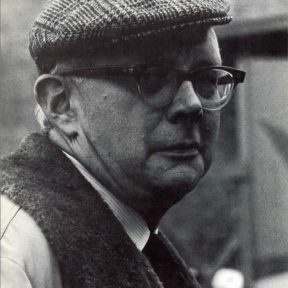
Irving Howe
: Photo from Wikimedia Commons / Author of Photo: Unidentified (Ensian published by University of Michigan)Overview
* Marxist literary critic
* Leader of the Independent Socialist League
* Founding editor of the socialist magazine Dissent
* Died on May 5, 1993
Irving Howe (1920-1993) was born Irving Horenstein, the son of Jewish immigrants who ran a New York grocery store that went out of business during the Great Depression. This poor boy from the Bronx would go on to occupy a central and commanding place in American intellectual life, becoming the preeminent American socialist literary critic of the 1950s-1970s.
Raised in a predominantly Jewish neighborhood and surrounded by people whose first language was Yiddish, Howe embraced Marxism at the age of 16 or 17 and joined the Young People’s Socialist League. To Howe, socialism seemed to be a gateway to all forms of knowledge, including an understanding of human nature. In honor of his transformation into a Marxist, he changed his surname from Horenstein to Howe. He attended City College of New York, where he became a Trotskyist student leader. In 1940 he left the Socialist Workers Party in favor of the “Third Camp” Workers Party founded by Max Shachtman, who was a major figure in the American Trotskyist movement beginning in the 1930s.
In 1941 Howe became the editor of the weekly publication Labor Action, a position he would hold for just a short period, until his departure for military service that same year. Opposed to America’s entry into World War II, he and his Trotskyist colleagues continued to agitate for socialism throughout the conflict, not as a way to counter fascism, but because they believed that the international brotherhood of workers would make war obsolete. He was curiously indifferent to the Holocaust while it was happening, though he later recognized his errors and wrote a classic study of Jewish immigrants called The World of Our Fathers. The Holocaust ultimately caused Howe to adopt a more conservative view of human nature. His desire to understand the nuances of human motivation and behavior fired Howe’s love of literature and his most famous critical work, The Politics of the Novel. He applauded George Orwell’s anti-totalitarian dystopia 1984, but never lost faith in socialism, which he came to regard as a moral vision rather than a specific political program.
In 1948, Howe joined the Independent Socialist League, of which he eventually became a central leader. When he left that organization in 1953, he took a professorial position at Brandeis University and became the founding editor of the socialist magazine Dissent, whose writers and editors have exerted an unsung influence on American journalism. By this time, he had come to support the United States in the Korean War.
In 1963 Howe returned to New York to take a teaching position at Hunter College. He was initially attracted to the New Left of the late 1960s and early 1970s, but became a critic once he discovered its totalitarian elements, which was earlier than most. In a summit between the editors of Dissent and the leaders of Students for a Democratic Society, Howe said he saw a “commissar” in SDS member Tom Hayden. The New Left repaid Howe by attacking him for refusing to give full-throated approval to the Stalinist regime of North Vietnam. The New Left further rejected Howe for his support (until 1970) of America’s military presence in Vietnam, and for his scathing literary attacks on the anti-war movement and New Leftists generally in a famous article titled “Styles of New Leftism.”
Howe and his magazine opposed Communism during the Cold War. In the 1980s, however, Dissent’s critical opposition to Communist dictatorships weakened, particularly in regard to the Sandinista government of Nicaragua. Howe personally banned a Dissent board member, Ronald Radosh, who had been to Nicaragua, from writing about the regime in the pages of Dissent because of his anti-Sandinista views. Howe was also mercilessly antagonistic to American conservatism. On the other hand, for the common sense and common decencies he displayed as a leftist, Howe was isolated and ignored by the New Left, which dismissed this life-long socialist as a neoconservative.
In addition to the aforementioned books, Howe also authored Beyond the New Left (1970); The Seventies: Problems and Proposals (1972); The American Communist Party: A Critical History (1974); Essential Works of Socialism (1976); Leon Trotsky (1978); Socialism and America (1985); and The American Newness: Culture and Politics in the Age of Emerson (1986).
Howe died of cardiovascular disease on May 5, 1993.